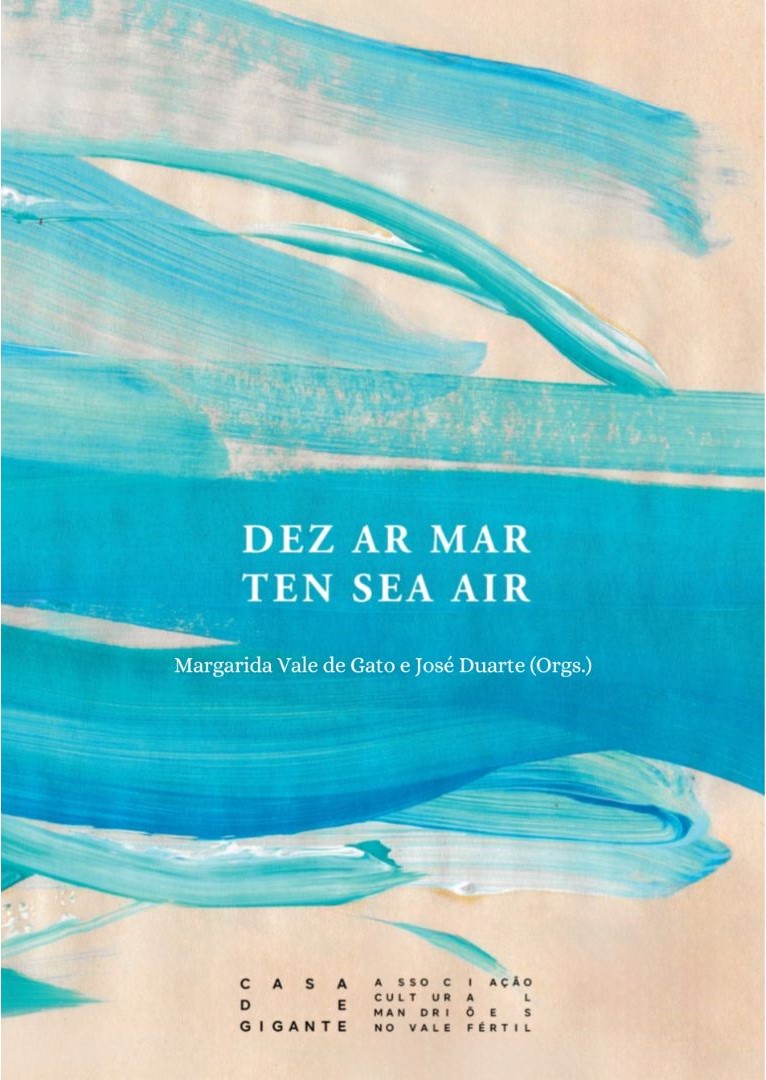Other Books
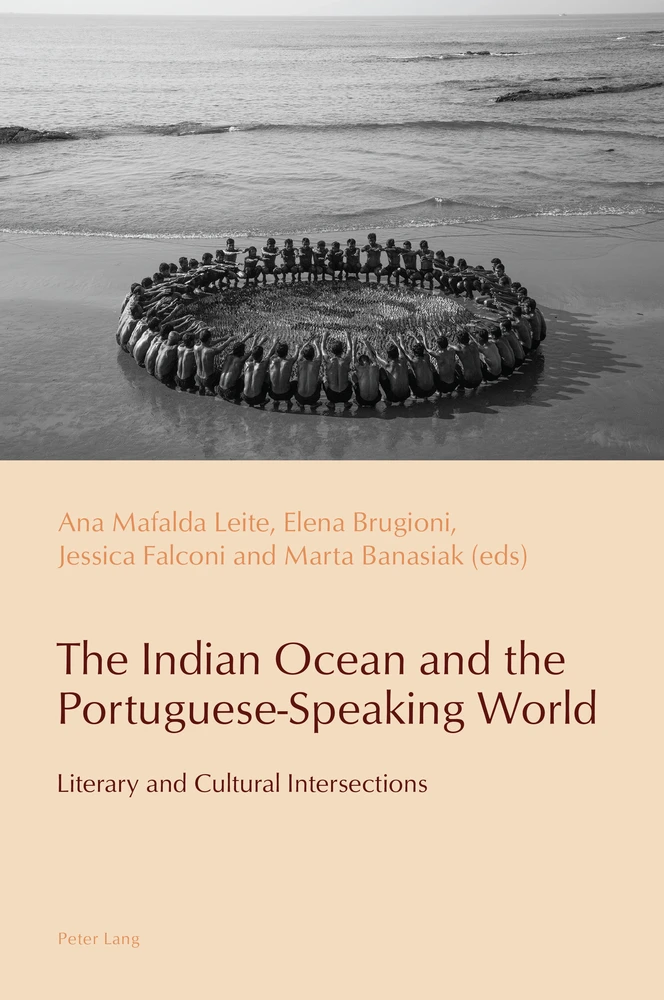
The Indian Ocean and the Portuguese-Speaking World: Literary and Cultural Intersections
Abstract:
Working from the premise that the Indian Ocean shapes new transnational imaginative geographies, this volume analyses how visual and written narratives from Lusophone, or rather «Lusotopic», spaces – Portugal, Mozambique, East Timor and Goa – point to productive critical dialogues with existing theories in Indian Ocean studies. The conceptual and epistemological revision presented in the book allows for the emergence of different theoretical constellations that are not solely based on the opposition between coloniality and the postcolonial condition, nor grounded upon the concept of linguistic or national identity, pointing to a set of original critical developments within the area of Indian Ocean studies.
Cite this book:
Leite, A., M., Brugioni, E., Falconi, J., Banasiak, M. (2025). The Indian Ocean and the Portuguese-Speaking World. Literary and Cultural Intersections. Oxford, United Kingdom: Peter Lang Verlag. Retrieved Dec 13, 2024, from 10.3726/b17729
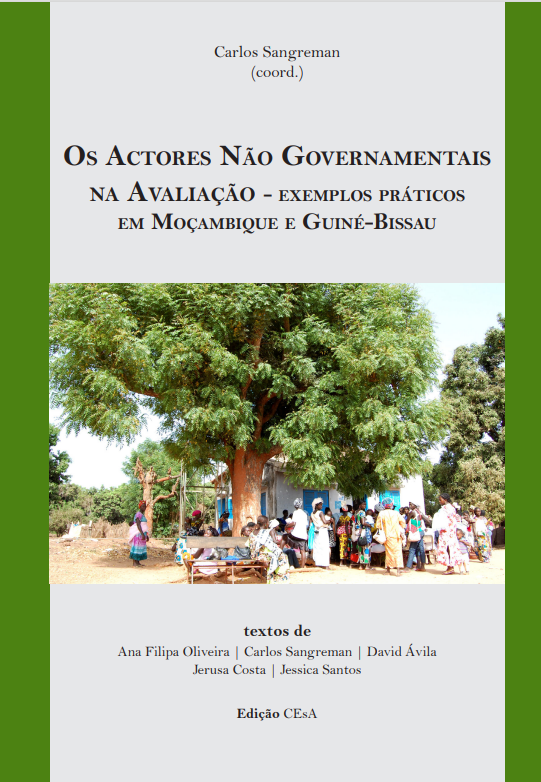
Os Actores Não Governamentais na Avaliação: Exemplos práticos em Moçambique e Guiné-Bissau
Abstract:
This work was conceived with a specific approach: the evaluation of the projects was conducted first, and only after its completion was the idea of publishing a small book on the evaluations considered. Since there was no coordination or dialogue between the “logic of theorization” and the “logic of practice” in the evaluation process intended for the evaluators (something that would undoubtedly have been interesting if done prior to the project evaluations), it was not feasible for the publication to revise certain aspects of the evaluations to systematically incorporate the international debate on the methodologies employed.
The book begins with an introductory section featuring a first chapter by Ana Filipa Oliveira, who provides a historical overview of ideas on evaluation and its institutionalization by various cooperation funders. In the second chapter, Jessica Santos analyses foundations as actors in the field of cooperation, drawing on her master’s research.
The second part contains a chapter by David Ávila, evaluating the “Tree of Hope” project in Maputo Province, specifically in the town of Namaacha in the area of agricultural production, which includes a significant research component, as well as the “Point by Point with Health” project in Inhambane. Jerusa Costa authors the following chapter, where she evaluates a set of projects supported by the Calouste Gulbenkian Foundation in the area of health in Guinea-Bissau. This chapter concludes with a response from ACEP to Jerusa Santos’s evaluation of the project “Women and Development: Self-employment and Self-confidence.”
Finally, Carlos Sangreman writes the conclusions and recommendations, proposing the effective institutionalisation of evaluation in the context of non-governmental cooperation through the implementation of a pilot certification project.
Cite this book:
Sangreman, Carlos (Coordenação) .(2014). Os actores não governamentais na avaliação : exemplos práticos em Moçambique e Guiné-Bissau. Edição CEsA. Apoio Fundação Calouste Gulbenkian. 2014

História de São Tomé e Príncipe de Meados do Século XIX ao Fim do Regime Colonial (1852-1974): As plantações, economia, cultura e religião
Abstract:
This book explains the reasons that led the Portuguese to recolonize the São Tomé and Príncipe islands from 1852 onwards and the strategies they adopted to institutionalize the new colonial order in the archipelago. They removed the natives from ownership of land and institutions and introduced the plantation economy model around which all economic and social life began to revolve, with the territory being divided between the populations of large plantations and the native populations. Work and land were exploited to the point of exhaustion, with mistreatment, racial discrimination, and a progressive decline in soil productivity. The production crisis emerged and exposed the limits of the plantation economy model. There were several attempts to forcefully hire native labor, which generated many conflicts and led to the “Batepá” massacre of 1953. This event raised the awareness of nationalists for the independence of the archipelago, which occurred on July 12, 1975. The book also addresses culture and religion as central elements that shape São Tomé and Príncipe society and identity.
Quotation:
Espírito Santo, A. (2023). História de São Tomé e Príncipe – De Meados do Século XIX ao Fim do Regime Colonial (1852-1974): As plantações, economia, cultura e religião. Lisboa: Nimba Edições.
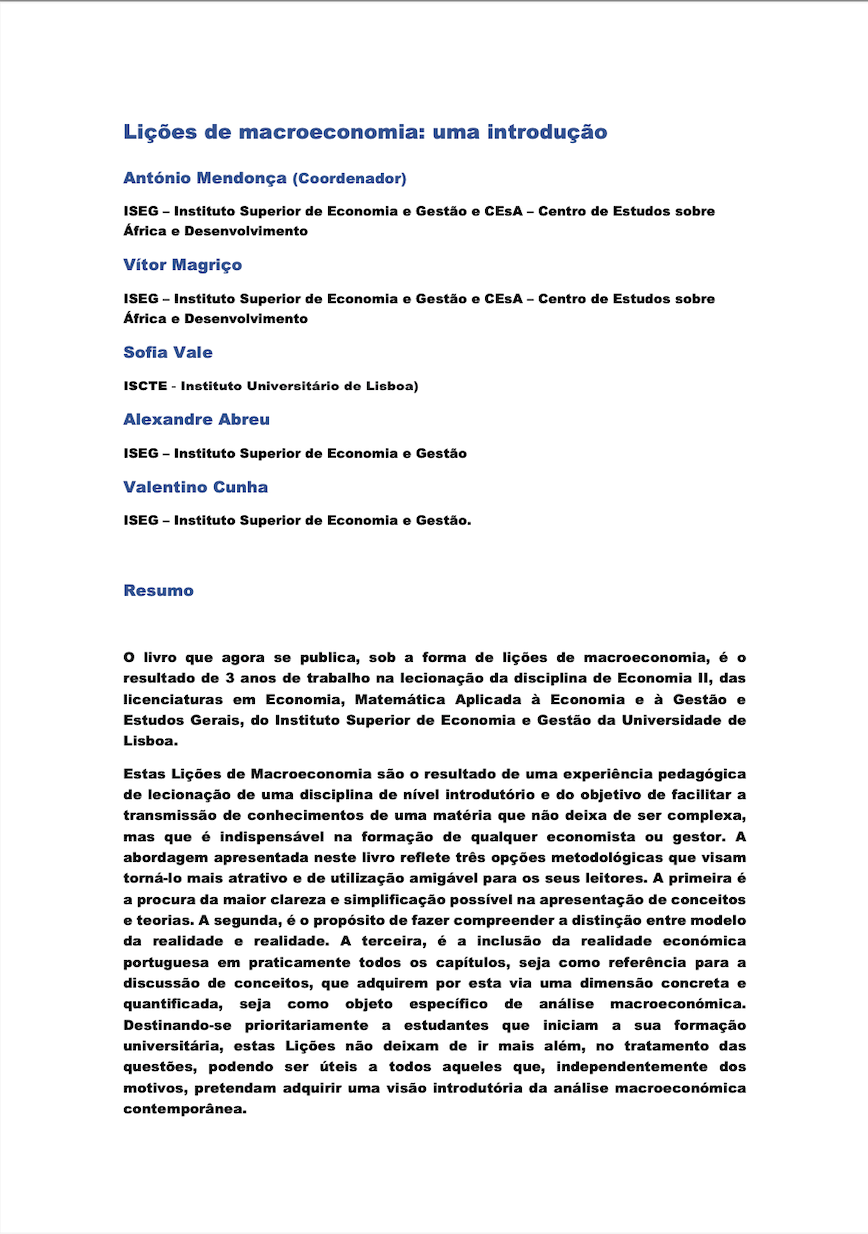
Lições de macroeconomia: uma introdução
Abstract:
The book that is now being published, in the form of lessons in macroeconomics, is the result of 3 years of work in teaching the discipline of Economics II, of the degrees in Economics, Mathematics Applied to Economics and Management and General Studies, at the Instituto Superior of Economics and Management at the University of Lisbon. These Macroeconomics Lessons are the result of a pedagogical experience of teaching an introductory-level subject and the objective is to facilitate the transmission of knowledge in a subject that is nonetheless complex, but which is indispensable in the training of any economist or manager. The approach presented in this book reflects three methodological options that aim to make it more attractive and user-friendly for its readers. The first is the search for the greatest possible clarity and simplification in the presentation of concepts and theories. The second is the purpose of making the distinction between the model of reality and reality understood. The third is the inclusion of the Portuguese economic reality in virtually all chapters, either as a reference for the discussion of concepts, which acquire a concrete and quantified dimension in this way, or as a specific object of macroeconomic analysis. Aimed primarily at students starting their university education, these Lessons do not fail to go further in dealing with the issues, and may be useful to all those who, regardless of their motives, wish to acquire an introductory vision of contemporary macroeconomic analysis.
Quotation:
Mendonça, António (Coordenador) e Vitor Magriço … [et al.] .(2021) . “Lições de macroeconomia: uma introdução”. Edições Silabo, Lisboa: p. 451.
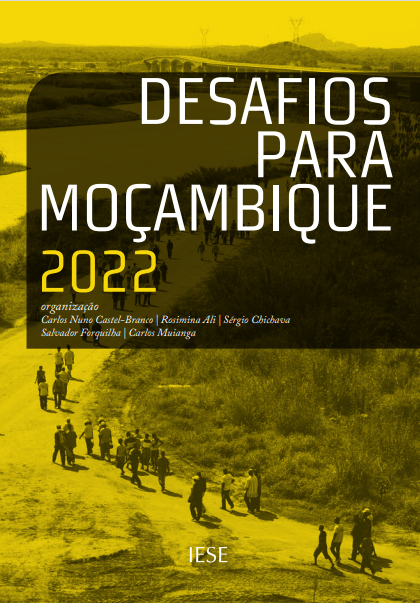
Desafios para Moçambique, 2022
Abstract:
This issue of Desafios para Moçambique (2022) comes as the country faces enormous challenges – the war in Cabo Delgado, with some signs of expansion into other provinces; the Rovuma basin gas extraction and liquefaction projects, which realise some 24 Challenges for Mozambique 2022 Introduction of the greatest challenges in Mozambique’s economic history; the lingering effects of the global crisis, the bursting and implosion of the economic bubble, of which the sovereign debt crisis was a manifestation, and the social and economic after-effects of the covid-19 pandemic. These challenges and crises stimulated research and resulted in lessons, some of which are developed in this issue. Recently ended in Maputo, the trial of some of the state agents and private agents involved in the illicit international financial transactions that resulted in the odious debts. What was already clear before – that these illicit transactions are a reflection of more general dynamics of expropriation, privatisation and financialisation of the state for private accumulation of capital, even if this is done at heavy social costs – has, if possible, become clearer. The hypothesis that the legal process, which we had the opportunity to follow for about a year and a half, only touched on the recipients of commissions for corruption and influence peddling, the executors of the great default against the public purse, was confirmed.
Quotation:
Castel-Branco, C.N., Ali, R., Chichava, S., Forquilha, S., Muianga, C. (2022) Desafios para Moçambique, 2022. IESE. Maputo, Moçambique. ISBN: 978-989-8464-58-3
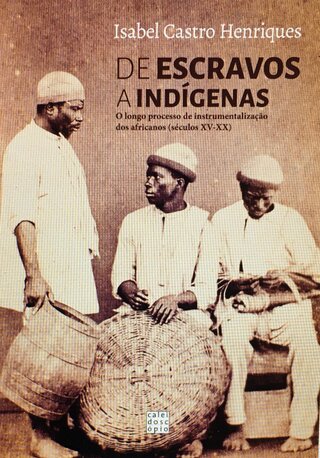
De escravos a indígenas: O longo processo de instrumentalização dos africanos (séculos XV-XX)
Abstract:
De Escravos a Indígenas: o Longo Processo de Instrumentalização dos Africanos (Séculos XV-XX), which brings together a set of texts written over forty years and dispersed in publications of diverse nature, not always easily accessible, aims to contribute to a renewal of historiography on the relations between Portugal and Africa, in the specific field of the forms of instrumentalisation of Africans carried out by the Portuguese for almost five centuries. A long process, whose internal nature proved capable of metamorphosis and reconversion in the nineteenth and twentieth centuries, ensuring the continuity of the violent ‘use’ of African populations, resorting to a new classificatory apparatus – savages, indigenous, assimilated – aimed at keeping Africans within the sphere of Portuguese domination, contributing to legitimising their enslavement and fixing distorting interpretations of History.
If a first line of study aims to review the history of slavery and slave trafficking and their ideologies in spaces of Portuguese ‘occupation’ like Angola, a second line of study privileges iconographic documents as historical sources, emphasizing their historical and informative dimension. Finally, the third line of this study seeks to highlight the evolution of the process of Portuguese instrumentalisation of Africans, which resorts to unprecedented classificatory categories – savage, indigenous, assimilated – and to practices that emerge from the slave labour of the past to ensure the colonial exploitation of African populations.
Value judgments, commodification, objectification, exploitation, ridiculing of African men fabricated Portuguese imaginaries that reduced the black/African to slavery, the savage/indigenous to lazy, thieving and drunk, the assimilated/’civilised’ to a ridiculous and negative copy of the white/Portuguese, enshrining the inferiorization of Africans, and in the same movement, glorifying the Portuguese ‘race’, hierarchizing the humanities and valuing the dimension and nature of the Portuguese actions, first slave-owning and then colonialist, that have left their mark on Portuguese society to this day.
Quotation:
Henriques, Isabel C., De Escravos a Indígenas: o Longo Processo de Instrumentalização dos Africanos (Séculos XV-XX), Lisboa, Ed. Caleidoscópio, 2019.

Literatures and Cultures of the Indian Ocean
Abstract:
Portuguese Studies is a biannual multi-disciplinary journal dedicated to research on the cultures, literatures, history, and societies of the Lusophone world. Ana Mafalda Leite, Elena Brugioni, and Jessica Falconi were the organizers of this issue of the journal, Literatures and Cultures of the Indian Ocean. The president of the Editorial Board for 2021 is Catarina Fouto, and the Journals editor is Emanuelle Rodrigues Dos Santos. The journal is published by the Modern Humanities Research Association (MHRA), an international organization with members in all parts of the world. The aim of the Association is to encourage and promote advanced study and research in the field of modern humanities. It is concerned to break down barriers between scholars working in different disciplines and to maintain the unity of humanistic scholarship in the face of increasing specialization. The present volume results frorn the scholarly work conducted by members of the research project NILUS — Narratives Ofthe Indian Ocean in the Lusophone Space. The main purpose of the project consisted in establishing a theoretical and disciplinary connection between Lusophone Literary, Visual and Cultural Studies and the transdisciplinary field Of Indian Ocean Studies. The project on the written and visual narratives hailing from, or related to, the territories formerly colonized by Portugal along the Indian Ocean, specifically Mozambique, Goa, and East Timor. This volume, therefore, constitutes an attempt to bridge a significant critical and disciplinary gap, motivated by an almost total lack of dialogue among the above-mentioned fields of study. This lack of dialogue becomes ever more apparent if we bear in mind the increasingly central role played by historical, anthropological, literary, and cultural studies of the Atlantic Ocean in addressing colonial and postcolonial cultural and identity-related outputs and relations from the territories that Out Of Portuguese colonial rule. Consider, for instance, the influence of the notion of Brown Atlantic (Atlântico Pardo), de,’eloped by the anthropologist Miguel Vale de Almeida as a counterpoint to Paul Gilroy’s Black Atlantic, or the use of the Portugal -Brazil-Angola triangulation in comparative and transnational- oriented literary and cultural studies.4
Quotation:
Leite, A.M.; Brugioni, E. & Falconi, J. (2021) (eds). “Literatures and Cultures of the Indian Ocean”, Portuguese Studies 37.2.
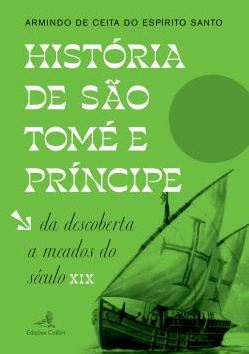
História de São Tomé e Príncipe: da descoberta a meados do século XIX
Abstract:
In História de São Tomé e Príncipe: da descoberta a meados do século XIX, the author explains how the Portuguese navigators arrived on the islands of São Tomé and Príncipe in the third quarter of the fifteenth century and transformed them into a social context for their development, but in which human and institutional relations were complex and even unbearable for the most disadvantaged, particularly on the island of São Tomé. Conflicts of all kinds worsened, particularly after the transition from a residential to a plantation society, with the intensification of the slave trade and the production and export of sugar. The long distance of the islands from the central power, located in Lisbon, constituted an ingredient that favoured the fomentation of conflicts in which the disrespect for the established rules was permanent and maintained during the period of domination of the native elite since the 17th century, marked around the main families that disputed access to power and control of wealth. The author shows that, despite its harshness, the colonial slave model had dynamics of social mobility that allowed some enslaved people to become free and others to become powerful in economic and political terms, even during the 16th century, becoming dominant until the mid-19th century.
Quotation:
Espírito Santo, A. (2021). História de São Tomé e Príncipe: da descoberta a meados do século XIX. Lisboa: Edições Colibri.
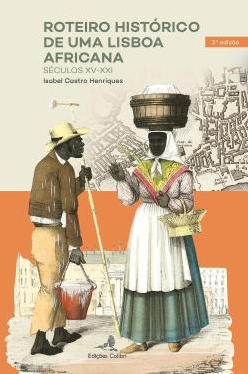
Historical Guide to an African Lisbon
Abstract:
Lisbon, a city of as many valleys and hills as there are myths surrounding its history and the people who invented it, stretches along the Tagus, where the river ends its course through Iberian land and plunges into the Atlantic Ocean. Lisbon was born on the hill of São Jorge Castle, where a Bronze Age settlement left its traces, which crossed with many other marks engraved by Greeks, Phoenicians, Lusitanians, Romans, Visigoths, Arabs, Jews and Christians. A long road of people and cultures, of stories and legends, of gods and heroes who, like Ulysses the mythical founder of the city – Olisipo – which owes its name to him, built and rebuilt this urban space. The aim of Historical Guide to an African Lisbon, XV-XXI Century is to show Lisbon’s Africanness, dispersed in a plurality of memories and immaterial and invisible traces in the days in which we live. History tells us about the settlement and life of thousands of Africans who for centuries took part in the process of building the Portuguese national fact. Travelling through the city, armed with historical knowledge, we are surprised by the vigorous African presence that invaded all spaces of Lisbon society, we reconstruct a hidden Lisbon, submerged by a centuries-old prejudice that still dominates our collective imagination and we understand, with greater clarity, not only behaviours, values, practices that remain in urban daily life, but also the constant reinventions of Portuguese and African identities, present in the country.
Quotation:
Castro Henriques, I. (2021). « Historical Guide to an African Lisbon, XV-XXI Century», versão revista e actualizada, Lisboa, Edições Colibri, 2021.
